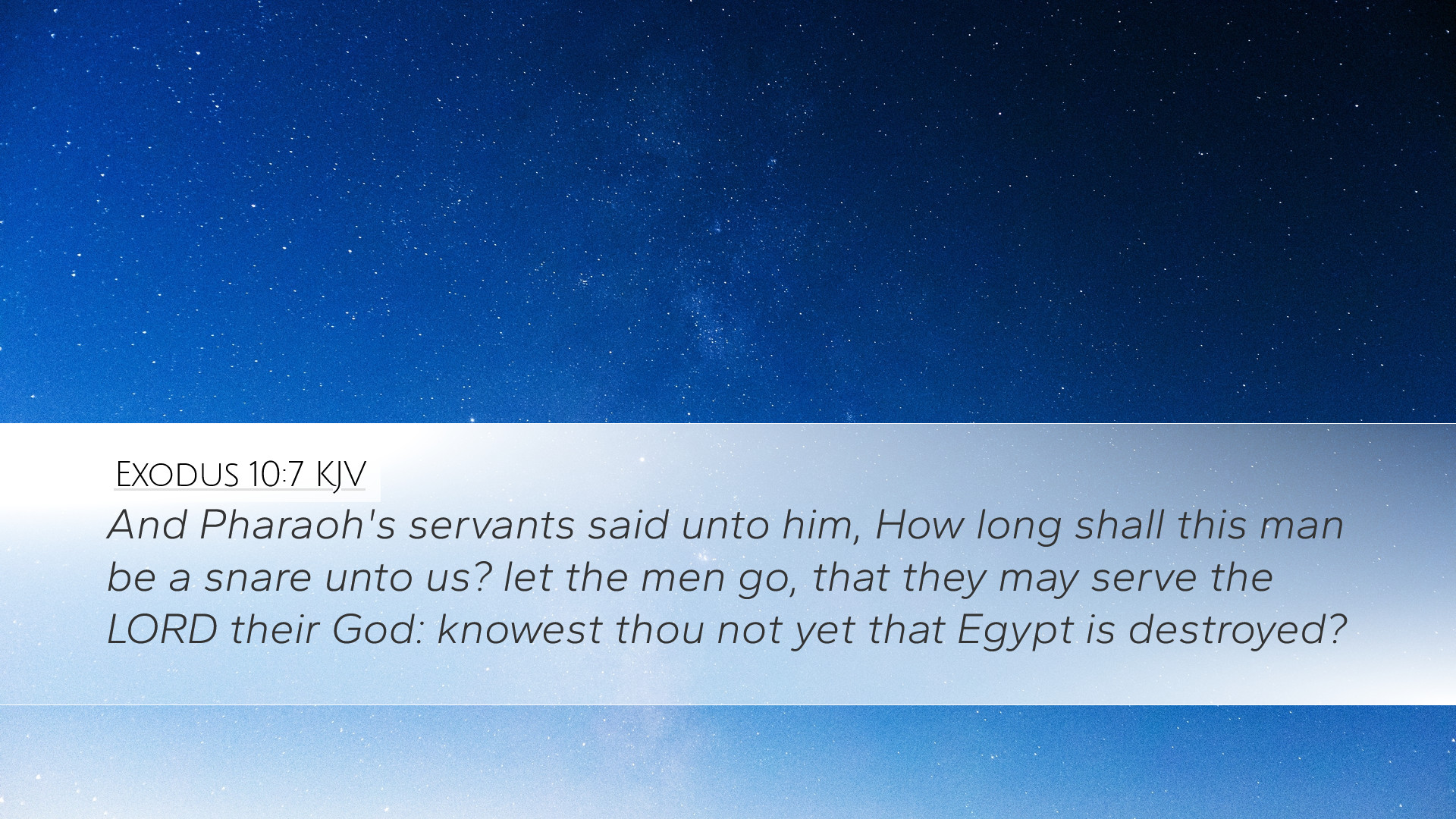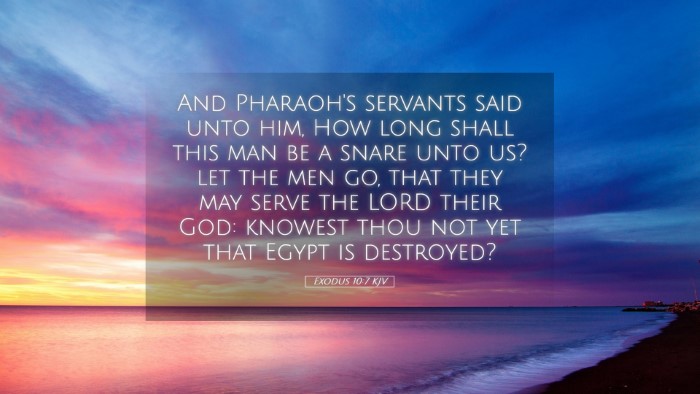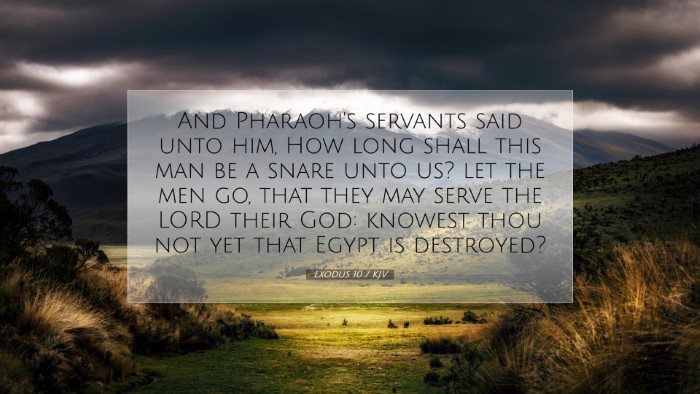Exodus 10:7 Commentary
Bible Verse: Exodus 10:7 - "And Pharaoh’s servants said unto him, How long shall this man be a snare unto us? let the men go, that they may serve the LORD their God: knowest thou not yet that Egypt is destroyed?"
Introduction
This verse occurs during the plagues of Egypt, specifically the eighth plague of locusts. The dialogue here reveals the growing desperation of Pharaoh’s servants and the internal conflict within Pharaoh’s court. Through the lens of several public domain commentaries, we explore the implications of this plea and the broader narrative of God's sovereignty over Pharaoh and Egypt.
Insights from Matthew Henry
According to Matthew Henry, this verse underscores the increasing severity of Egypt’s plight under God’s judgments. He elaborates that Pharaoh's advisers recognize the futility of resisting God’s will, acknowledging that their nation stands on the brink of ruin.
Key Themes:
- Recognition of Defeat: The servants are beginning to see that continued rebellion against God only leads to destruction, indicating the hardening of Pharaoh’s heart.
- God’s Authority: This moment reflects God’s ultimate control over the situation, as He orchestrates events to bring about the liberation of His people.
- Desperation and Submission: The plea from Pharaoh’s own men reveals a turning point—acknowledging that submission to God might be the only hope for Egypt.
Insights from Albert Barnes
Albert Barnes emphasizes the irony in the request of Pharaoh's servants. They understand that the plagues serve as a warning not only to Pharaoh but also to themselves. Their appeal signifies a collective recognition of disaster building around them, suggesting that even those closest to power can perceive the looming judgment of God.
Reflection Points:
- Understanding of Judgment: Barnes points out that the servants illustrate a common theme within Scripture—a clear acknowledgment of God's judgment leads to various responses.
- Human Response to Divine Authority: This incident serves as a reminder of how often God’s authority is recognized too late. Their call for liberation reflects both fear and a desire for repentance.
- The Role of Leadership: It highlights how leaders often ignore wise counsel, which can lead to collective downfall, stressing the importance of heeding God’s warnings.
Insights from Adam Clarke
Adam Clarke provides an analysis of the motivations behind Pharaoh's advisers' pleas. He suggests that their desperation is born from personal and national devastation. They realize that their ongoing suffering is not merely incidental but a direct consequence of Pharaoh’s obstinacy against the divine will.
Critical Observations:
- Consequences of Rebellion: Clarke notes that their recognition of the situation’s gravity conveys a deeper understanding of the consequences of rebellion against God.
- Call for Action: This moment is pivotal; it serves as a collective cry for action against Pharaoh’s inflexibility, urging urgency for the release of the Israelites.
- Character of Pharaoh: Clarke critiques Pharaoh's leadership, suggesting that it is marked by pride and a lack of foresight, which blinds him to the reality unfolding around him.
Theological Implications
The verse offers rich theological implications for understanding divine sovereignty and human agency. The struggle of Pharaoh illustrates a broader theme found throughout Scripture where human leaders clash with divine plans.
Discussion Points:
- The Nature of Hardness of Heart: Reflect on how resistance to God can bring about destruction, not only to the individual but also to those surrounding them.
- God’s Power in History: This passage invites reflection on how God has continuously intervened in human affairs to accomplish His purpose—liberation in this case.
- The Role of Fear in Leadership: The fear expressed by Pharaoh’s servants introduces a critical reflection on what constitutes true authority: submission to God versus adherence to human pride.
Practical Applications
As we reflect on Exodus 10:7 and its commentary, several practical applications arise for pastors, students, theologians, and scholars:
- Encouragement for Repentance: Encourage congregations to recognize the seriousness of ongoing rebellion against God and the need for genuine repentance.
- Call for Discernment: Foster a spirit of discernment in leadership contexts, urging leaders to be attentive to wisdom from those around them.
- Emphasis on God’s Sovereignty: Reinforce the belief that God's sovereignty persists, even amidst apparent chaos, and His purposes will ultimately prevail.
Conclusion
Exodus 10:7 serves not only as a historical accounting of the plagues on Egypt but also as a profound reminder of the struggle between divine authority and human pride. The insights gathered from Matthew Henry, Albert Barnes, and Adam Clarke enrich our understanding of this pivotal moment in biblical history, revealing themes of recognition, desperation, and the overarching sovereignty of God in the midst of human rebellion.


